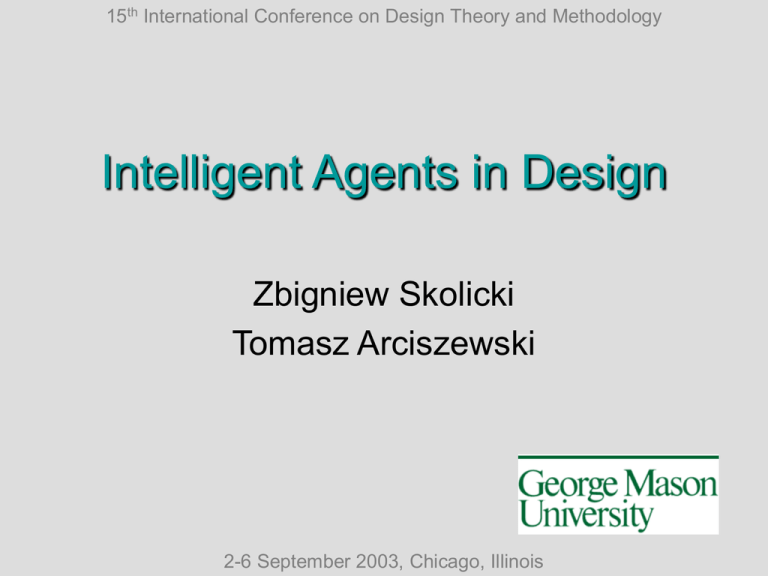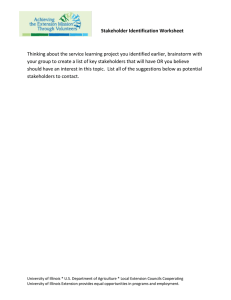Intelligent Agents in Design Zbigniew Skolicki Tomasz Arciszewski 15
advertisement

15th International Conference on Design Theory and Methodology Intelligent Agents in Design Zbigniew Skolicki Tomasz Arciszewski 2-6 September 2003, Chicago, Illinois 15th International Conference on Design Theory and Methodology Outline • • • • • Agents and learning Attributes Statistical analysis Directed Evolution perspective Conclusions 2 2-6 September 2003, Chicago, Illinois 15th International Conference on Design Theory and Methodology Agents and learning 3 2-6 September 2003, Chicago, Illinois 15th International Conference on Design Theory and Methodology Agent versus Intelligent Agent • Agent – Autonomous – Active – Takes initiative – Repeatedly interacts with the environment (and the user of other agents) – Mobile? • Intelligent Agent: – Adaptive – Learning 4 2-6 September 2003, Chicago, Illinois 15th International Conference on Design Theory and Methodology Our definition of Intelligent Agent (IA) An intelligent agent is an autonomous system situated within an environment, it senses its environment, maintains some knowledge and learns upon obtaining new data and, finally, it acts in pursuit of its own agenda to achieve its goals, possibly influencing the environment 5 2-6 September 2003, Chicago, Illinois 15th International Conference on Design Theory and Methodology Attributes 6 2-6 September 2003, Chicago, Illinois 15th International Conference on Design Theory and Methodology Attributes • 27 binary attributes For example: Information – whether agents store information locally or in some shared memory Stability – whether agents can reconfigure in the runtime Swarm? – whether there is enough number of agents interacting to create macroscopic effects • Values for attributes: 0 = simple behavior 1 = complex behavior 7 2-6 September 2003, Chicago, Illinois 15th International Conference on Design Theory and Methodology 5 classes of attributes • Sensing & Acting What the pattern of interaction is, is it dynamic, what causes action, what resources are available? • Reasoning What is communicated, how deep and fast and prompt the reasoning is? • Learning & Knowledge How adaptable the agent is, where is the knowledge stored, is it consistent, what can an agent learn? • Structure How is an agent built, is it reusable, can it reconfigure, can new agents be added? • Quantity How many agents interact and can it lead to an emergent behavior? 8 2-6 September 2003, Chicago, Illinois 15th International Conference on Design Theory and Methodology Agents in Design 9 2-6 September 2003, Chicago, Illinois 15th International Conference on Design Theory and Methodology Agents in Design • Reemergence of interest • First International Workshop on Agents in Design, MIT 2002 10 2-6 September 2003, Chicago, Illinois 15th International Conference on Design Theory and Methodology Conducted analysis • • • • 17 agents or agent systems 27 binary attributes 17 x 27 = 459 values assessed Statistical analysis of the values – Mean attribute value – Each attribute analyzed separately – Swarm systems analyzed separately 11 2-6 September 2003, Chicago, Illinois 15th International Conference on Design Theory and Methodology Results Expected mean attributes value: Simple agents Complex agents Gaussian distribution attributes chosen independently? 2-6 September 2003, Chicago, Illinois 12 15th International Conference on Design Theory and Methodology Identified Agents Features (each attribute analyzed independently) 1.1 1 0.9 0.8 0.7 0.6 0.5 0.4 0.3 0.2 Emergence Amount Swarm? Agent flex Reusable System flex Layers Diversity Stability Know others Adaptiveness Naïve Ontologies Language Transparency Speed Empathy Roles Reaction Mobility Benevolence Goal Autonomy 0 Commitment 0.1 Resources • • • • average attribute Information • Act locally Cooperate Are sophisticated Are not real-time Do not model other agents Do not show internal state Are trustful Acquire knowledge Have stable architecture Work in groups Perspective • • • • • 13 2-6 September 2003, Chicago, Illinois 15th International Conference on Design Theory and Methodology Swarm agents unique features Act more locally Share resources Have less autonomy Are more competitive Are more mobile May discover roles in runtime React more directly Are not real-time… Are less transparent Use fixed language Assume information to be true Are less reusable Swarms vs. Individuals swarms individuals 1.2 1 0.8 average value • • • • • • • • • • • • 0.6 0.4 0.2 0 t l t y y n ve en ge ïv e ies s s rs l ity rs i ty ble ex ex un m? nce es oa my c e i li t l es ion ed th c y io o ar at ecti urc G no l en ob Ro ac t pe pa ren i tm ua Na log ne the a bi ay e ers s a m fl t fl ge m S m a o e m ng L Div eu te t o evo M to tiv e w o St e n Am Sw er p or rs p es R E u n a g m f s R s p A en L o A O a no In Pe R Em Sy an C B Ad K Tr attributes • = 90% confidence 2-6 September 2003, Chicago, Illinois 14 15th International Conference on Design Theory and Methodology Directed Evolution 15 2-6 September 2003, Chicago, Illinois 15th International Conference on Design Theory and Methodology Directed evolution • Evolution of engineering systems occurs according to Patterns of Evolution • Directed Evolution enables planning and development of future generations of engineering systems. • Theory of Inventive Problem Solving (TRIZ) • Line of evolution 16 2-6 September 2003, Chicago, Illinois 15th International Conference on Design Theory and Methodology Current stage of IAs (according to Patterns of Evolution) • • • • • • • Run-time acquisition of knowledge Growing number of features Growing flexibility and controlability Starting simplification Component architecture ? Common-day use Automation and decreased human involvement 17 2-6 September 2003, Chicago, Illinois 15th International Conference on Design Theory and Methodology Conclusions • Learning and adaptability important • Agents in Design still in early evolution stages • Directed Evolution approach premature • Research niches: simple, reconfigurable, reusable, competing, real-time, modeling others, non-naïve agents 18 2-6 September 2003, Chicago, Illinois 15th International Conference on Design Theory and Methodology Thank you for your attention! Questions? 2-6 September 2003, Chicago, Illinois


